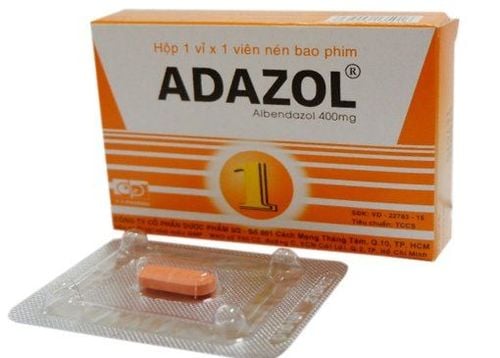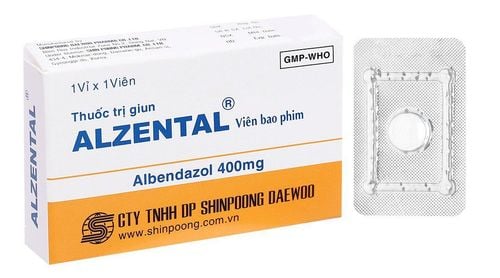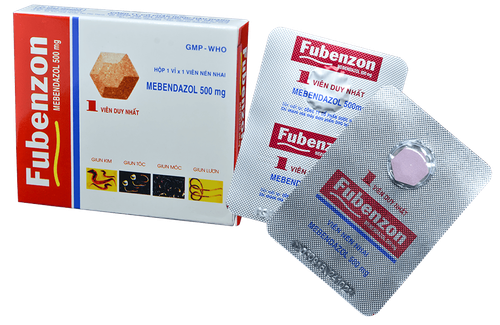This is an automatically translated article.
Piperazine is a special drug for roundworms and pinworms. Piperazine causes the worms to become soft, unable to attach to the intestinal wall and then be pushed out by peristalsis.
1. What are the effects of Piperazine?
Piperazine belongs to the group of anti-worm drugs, with the main ingredient being Piperazine hexahydrate. Piperazine is a heterocyclic organic base, which causes worms to become flaccid, no longer able to attach to the intestinal wall and then push the worms out through peristalsis.
Piperazine is prepared in many different forms and strengths such as tablets of 200mg, 300mg, 500mg; Syrup content 500mg/5ml, 750mg/5ml; Oral solution or suspension 600mg/5ml and 3.5% granules.
Piperazine is indicated for use in the treatment of roundworms and pinworms.
2. How to use and dosage of Piperazine
With most dosage forms being tablets, syrup, suspension or granules, Piperazine is taken orally. Before taking the medicine, the patient does not need to fast or use bleach.
Dosage of Piperazine in the treatment of roundworm is as follows:
Children from 12 years old and adults: 75mg/kg body weight/day. The maximum dose should not exceed 3.5g/day, taken once/day before breakfast or divided into 2-3 times to drink before meals, take the drug for 2-3 days. Children from 2 to 12 years old: 75mg/kg body weight/day. The maximum dose should not exceed 2.5g/day, taken once/day before breakfast or divided into 2-3 times to drink before meals, take the drug for 2-3 days. Children under 2 years old: 50mg/kg/day. Note, the use of Piperazine in children under 2 years old requires the supervision of a doctor. The dose of Piperazine in the treatment of pinworms in both adults and children is 50mg/kg body weight/day, taken once a day before breakfast or divided into 2-3 times to drink before meals, taking the drug continuously in the morning. 7 days. After 2-4 weeks, use again.
Note, it is necessary to treat roundworms and pinworms with Piperazine for all family members.
An overdose of Piperazine can cause symptoms such as temporary respiratory depression, shortness of breath, muscle fatigue in the extremities, and convulsions. In case of overdose, the patient should be treated symptomatically and support respiratory and circulatory support. If overdose has occurred within a few hours, measures should be taken to perform gastric lavage or induce vomiting.
3. Piperazine side effects
Piperazine can cause some unwanted side effects with the frequency of occurrence as follows:
Uncommon: Abdominal pain, nausea, vomiting, diarrhea, dizziness, headache, drowsiness, tremor and muscle fatigue . Rare: Bronchospasm, cough, urticaria, skin rash, skin allergy and pruritus. Very rare: Severe neurological reactions (rare in the general population, but may occur in young children, people with neurological diseases, kidney disease or patients with overdose). If you see signs of hypersensitivity after taking Piperazine, the patient should stop taking the drug and notify the doctor immediately or immediately go to the medical facility to be checked.
4. Some notes when using Piperazine
Do not use Piperazine in people with hypersensitivity to the ingredients of the drug, people with neurological disease or epilepsy, people with liver and kidney failure. Patients with anemia or severe malnutrition should stop taking Piperazine and show signs of hypersensitivity or intolerance to the drug. Pregnant women should only use Piperazine if absolutely necessary and there is no alternative because the safety of the drug has not been established. During the first 3 months of pregnancy, the mother should not take the drug because there have been some reports related to malformations in the fetus. Nursing mothers should use caution when taking Piperazine because small amounts are excreted in breast milk. However, to date, there have been no reports documenting the effect of the drug on breastfed infants. Concomitant use of high-dose Piperazine with chlorpromazine and other phenothiazines may increase the side effects of these two drugs. Therefore, these drugs should not be taken together. Piperazine if used concurrently with Bephenium, Levamisol and Pyrantel cause antagonistic effects. Therefore, these drugs should not be used together. Above is all information about Piperazine, patients need to carefully read the instructions for use, consult a doctor / pharmacist before use. Absolutely do not arbitrarily buy Piperazine to treat at home because there may be unwanted side effects.













